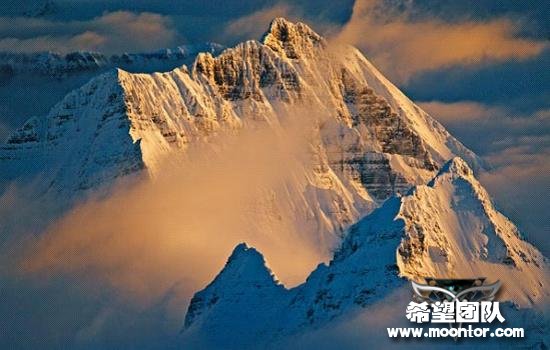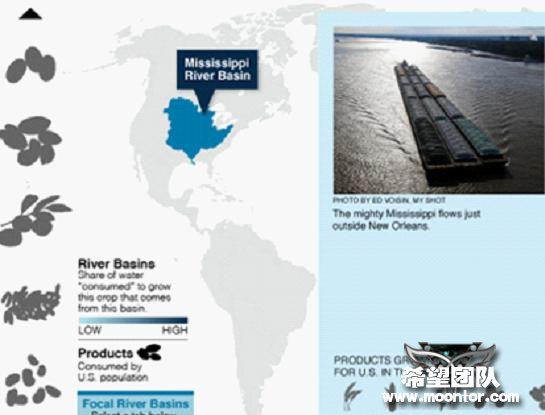|
蓝星新时代网 | 版权所有 | 联系信箱及支付宝 fozairenjian#126.com (使用时#改@)
本站域名 www.lxxsd.cn 站内
|

冰川融化进程最新报道
Melting Glaciers Mean Double Trouble for Water Supplies
冰川融化意味着水源供应的双重问题
New research shows that as ice disappears, overall evaporation speeds up.
最新研究表明冰川融化的进程正在全面加快

Glaciers like those on Vulture Peak in Montana's Glacier National Park are receding around the world, putting critical water supplies at risk.
Photograph by Michael Melford, National Geographic
类似蒙大拿冰川国家公园中的灵鹫山一样的冰川正在逐渐从陆地上消逝,饮用水的危急供应问题已置于危险境地。
照片来自国家地理杂志的迈克尔·米尔福德
This story is part of a special National Geographic News series on global water issues.
下面的这个故事摘自国家地理频道关注全球水问题的特别新闻系列
Mountain glaciers long have been known to be in retreat as the planet warms. But the process is occurring even more rapidly than previously believed, scientists said earlier this month in San Francisco at a meeting of the American Geophysical Union.
地球变暖造成的全球冰川消逝早已不是新鲜,然而最新的研究表明冰川退化的速度远比我们预计要快得多。本月早些时候在旧金山举行的美国地球物理联盟上科学家如上说。
For example, said Garry Clarke, professor emeritus of glaciology at the University of British Columbia in Vancouver, Canada, the massive glaciers of Canada's Saint Elias region, now comprised of nearly 98 cubic miles of ice (453 cubic kilometers), are likely to be cut in half by 2100, even under middle-of-the-road climate-change scenarios.
科学家加里·克拉克的讲解:位于加拿大温哥华的不列颠哥伦比亚大学冰川学权威教授发现,加拿大圣埃利亚斯地区的魁伟冰川,现代的记录是它由将近98立方体冰英里构成(453立方公里),在2100年很可能只剩下一半,甚至将退居冰川境界下以下。
"[And] that's the good news," Clarke said.
“但这或许并不是最坏的消息”克拉克如是说。
In parts of the Canadian Rockies, he said, today's glaciers will all but disappear completely, while others will shrink to remnants just 5 to 20 percent of their current size.
根据他的调查,加拿大落基山脉的一部分将会完全消失,另一部分会收缩至如今的5~20%。
"We think that we will be witness over the next century mainly to the disappearance of the glaciers of western North America," he said.
“我认为我们我们将成为美国西北部冰川在百年消逝过程中的主要见证者”克拉克说。
Other disturbing finds are coming from the Himalayas, where Ulyana Horodyskyj, a graduate student at the University of Colorado's Cooperative Institute for Research in Environmental Sciences, has been monitoring supraglacial lakes—ponds of water that appear on the surface of melting glaciers.
喜马拉雅山也岌岌可危,科罗拉多主攻环境科学专业的一名在校研究生常年检测冰川上的湖—小型池塘的出现将冰川融化进程可视化的展现出来。
"Most people think about glaciers receding," she said, "but they also But glaciers act as natural reservoirs, storing water in the winter and doling it out in the summer as the ice slowly melts.
"If most of it disappears, there will be extreme consequences for most of these regions," Clarke said. "The stream flow will change, the timing of peak stream flow will change, and the temperature of streams will change."
shrink vertically. These lakes can lead to enhanced melting, and we see a lot of them forming throughout the Himalayas . . . You can think of these lakes as cancers that are consuming the glacier."
“大多数人都在关注冰川融化”她说,“但他们也同样在收缩。这些冰上湖可以加剧这种进程,我们可以看到这些冰上湖的大部分是随着喜马拉雅的收缩逐渐增加的…你可以把这些冰上湖当做喜马拉雅山的癌细胞扩散进程。”
Even if all of the world's mountain glaciers were to melt, the effect on sea level rise would be small: Clarke, estimates, for example, that even if all of western Canada's glaciers were to completely melt away, the oceans would rise by only 6.6 millimeters (a quarter-inch), "not enough to worry anyone."
即使世界上所有的冰川全部融化,对海平面上升的影响也微乎其微:克拉克给我们算了这么一笔账,假使加拿大西部冰川全部完全融化,海平面只会上升6.6毫米(一个盒式磁带),“不足以十分担心”

Glacial Water(冰水)
But glaciers act as natural reservoirs, storing water in the winter and doling it out in the summer as the ice slowly melts.
但冰川的作用好比天然水库,冬季贮存水,夏季通过冰川融化释放水。
"If most of it disappears, there will be extreme consequences for most of these regions," Clarke said. "The stream flow will change, the timing of peak stream flow will change, and the temperature of streams will change."
“如果他们几乎消失殆尽,将给很多地区带来极其严峻的后果,”克拉克如是说。“这将会影响到水流量最高峰值以及水流量最高峰的出现次数,还有水温的平均值。”
Even the total volume of runoff will change, added Michel Baraer, of McGill University, Montreal, Canada, because glacial ice keeps the water locked away in a form in which it doesn’t easily evaporate.
加拿大蒙特利尔的麦吉尔大学教授米歇尔·巴里尔补充道:总径流量也会随之改变,冰川的存在使水流量锁定为一个不容易蒸发的形式。
Thus, even if precipitation remains the same in the high mountains, more of the water will be in liquid form, which evaporates more quickly.
从而,降水发生在同一座高山,因贮存方式不同,液体也会蒸发的要快。
Building dams also will not solve the problem of decreasing runoff. "Evaporation from reservoirs is much higher than sublimation [conversion of solid into gas] from glaciers," Baraer said. "Dams will never, ever, replace the [natural] hydrological systems that are in place today."
水坝也无法解决径流量的问题。从水库蒸发水的速度要比冰川的升华(由冰变为水蒸气)速度快的多。水坝永远不可能取代大自然贮水的力量。巴里尔如是说。
Peak Water?(山顶的水?)
Already, Baraer said, Peru is on the verge of facing water shortages. That's because one of the largest rivers coming off the high Andes glaciers, the Rio Santa, is already running low on glacial melt, he said.
巴里尔说:秘鲁已接近水资源枯竭。那是因为从安第斯山脉流下的大河里奥圣诞河因冰川的不断融化已几近枯竭。
Previously, scientists had thought the problem lay several decades in the future.
曾经,科学家曾深信不疑的认为这些问题会在新世纪的几十年内得到有效解决。
But based on satellite measures of ice cover and water-flow at gauging stations in the river, his team has concluded that the Rio Santa has already hit "peak water"—the point at which glacial runoff plateaus and then begins to decline.
根据卫星监测和当地多项技术监测,得出一个惊人的结论,里奥圣诞河里的水已经参杂了山顶的水。里奥圣诞河的发源地已经延至安第斯山脉的顶峰。
"What it means is that instead of having 10, 20, or 30 years' perspective in which to find some solution for water allocation, these years did not exist," he said.
“这表明了我们并没有10,20,30年去供我们找到水量分配方法,这些假设的时间并不存在”他说。
And that's just the beginning. Much of South America, with its high mountains and tropical sunshine, appears to be particularly vulnerable to climate-induced glacial shrinking.
那仅仅是个开始,南美大部分的高山,由于热带阳光逐渐向两级推移,脆弱的冰川在猛烈的收缩。
Thus, he said, the next step will be to turn to Peru’s neighbors, particularly Bolivia and northern Chile, to see if similar stream-flow changes are occurring there.
从而,他说,下一步我们将会更多的关注秘鲁的邻居,尤其玻利维亚和北方的治理,看是否有同样的冰川消融发生在那里。
|
蓝星新时代网 | 版权所有 | 联系信箱及支付宝 fozairenjian#126.com (使用时#改@)
本站域名 www.lxxsd.cn 站内
|